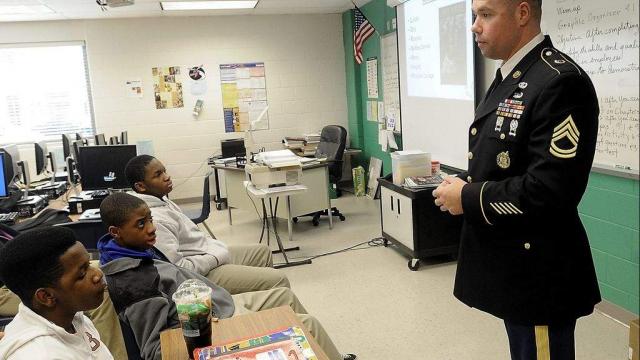
An Army program meant to increase the number of recruits during the Iraq and Afghanistan wars devolved into an illegal free-for-all that could cost taxpayers close to $100 million, military investigators say, describing new details of what they called a long-running scheme among National Guard recruiters that went undetected for years.
Army officials appeared before a Senate hearing February 4 and sketched out a huge criminal endeavor that has implicated more than 1,200 people — 200 of them officers — including two generals and dozens of colonels. Criminal investigators for the Army said soldiers, civilians and National Guard recruiters had used the program as a “bounty” from which they could illegally collect money for recruiting soldiers they had not recruited.
Senator Claire McCaskill, Democrat of Missouri and chairwoman of the Senate panel holding a hearing, was visibly irate and repeatedly expressed anger and surprise as she listened to Army investigators describe the fraud they say took place under a program that began in 2005 at the height of the Iraq war to address an enlistment shortfall in the Army National Guard.
Under the program, National Guard soldiers — and their relatives, as well as other civilians and retirees — signed up to be recruiting assistants and could earn up to $7,500 for each new recruit they managed to enlist. But investigators said that in many cases, high school guidance counselors and even principals with access to their students’ personal information took credit for recruiting students who they happened to know were joining the Army.
In the end, according to Maj. Gen. David E. Quantock, commanding general of the United States Army Criminal Investigation Command, fraudulent payments that have already reached $29 million could, by the end of the investigation, come close to $100 million.
“So there were high school counselors who heard there was a bounty and knew kids were signing up for the military, so they went and took advantage of this?” Ms. McCaskill said.
One person who is now under prosecution was fraudulently paid $275,000 under the recruitment program, and four others received more than $100,000 each, according to papers released Monday by the Senate panel.
Some recruiting assistants eligible for bonuses were coerced into splitting them with military recruiters, who were barred from getting payments themselves. Other military recruiters did not tell their civilian assistants about the bonuses, but registered them for the program, and then substituted their own bank information for their civilian assistants, army officials said.
The bonuses helped the Army increase enlistment during the war years; in return the Army paid more than $300 million for 130,000 new recruits. The investigation was first reported by The Washington Post in 2012.
After reports of potential fraud in 2007, the Army examined the program and found that 705 recruiters were linked to payments with a high risk of fraud, including multiple large recruiting bonuses going into the same bank accounts. Federal prosecutors have indicted several former recruiters and soldiers accused of abusing the bonus program.
The investigation comes at a fraught time for the Army, just as the country is moving away from the military buildup of the Iraq and Afghanistan wars, and grappling with issues of a smaller military with an attendant smaller budget. The Pentagon is already experiencing budget cuts and its programs are being squeezed; any perception that money is being stolen may provide additional fodder for those who are already critical of a large military.
The Army terminated the recruiting bonus program in February 2012 and ordered a wholesale review. Officials say that they may not finish the investigation until 2016 because of the scale of the fraud.
Nine cases were investigated between 2007 and 2009, General Quantock said. He said it was not until 2010, when 10 cases surfaced, that investigators realized that they had a major, widespread problem.
“That’s a long time when you’ve got fraud going on,” said Senator Kelly Ayotte, Republican of New Hampshire.
Lt. Gen. Clyde A. Vaughn, former director of the Army National Guard, defended the recruiting program as necessary and effective, but acknowledged that he was unaware of the abuses at the time.
“I told them: We got to catch the first peckerwoods to get out here and mess this thing up for everybody, and we got to prosecute them quickly,” General Vaughn said.
The statute of limitations on prosecutions may allow some soldiers to avoid being charged, Army officials said — a result that Ms. McCaskill said would “break my heart.”
She called the investigation “one of the largest that the Army has ever conducted, both in terms of the sheer volume of fraud and the number of participant,” adding that those found guilty “have dishonored the uniform we are all so proud of.”
3 WAYS TO SHOW YOUR SUPPORT
- Log in to post comments
















